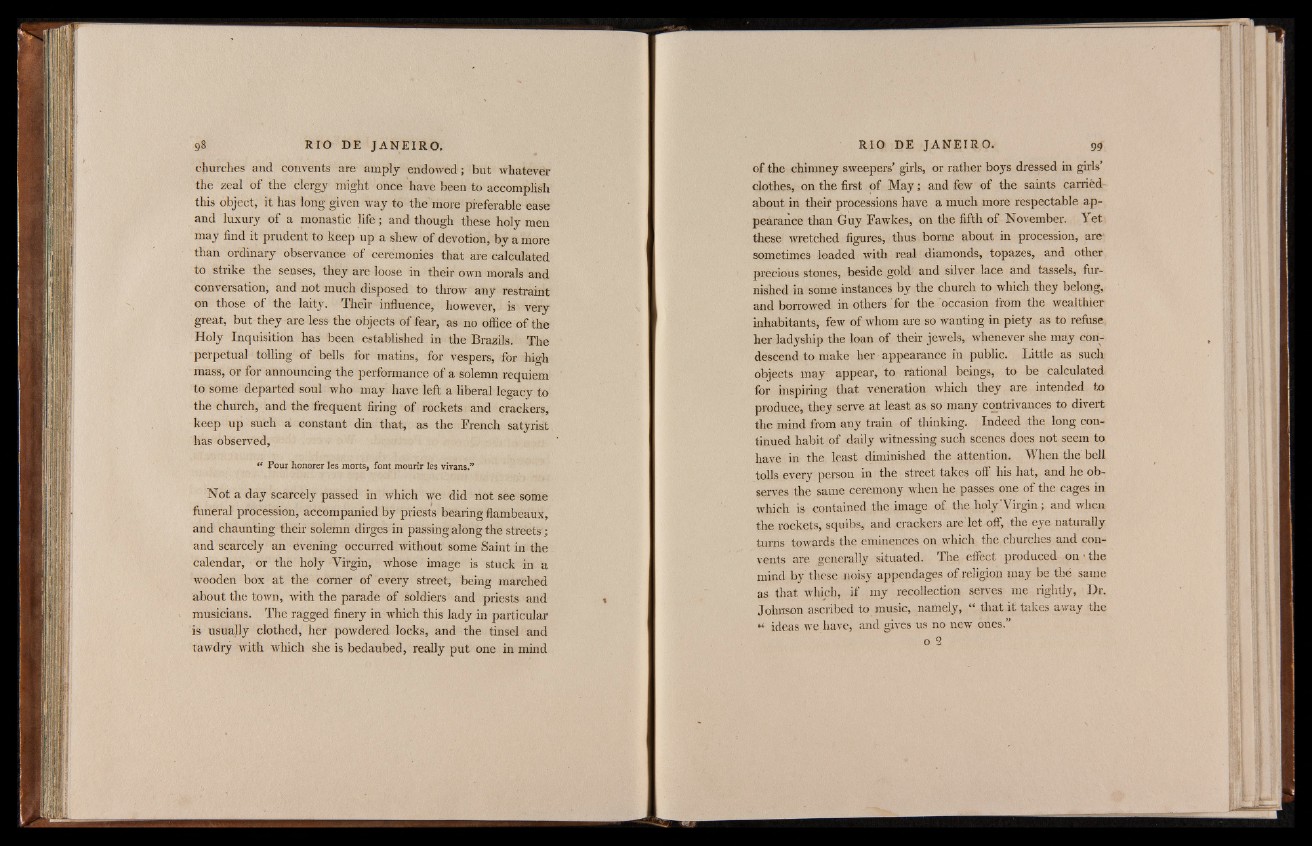
churches and convents are amply endowed; but whatever
the zeal of the clergy might once have been to accomplish
this object, it has long given way to the more preferable ease
and luxury of a monastic life; and though these holy men
may find it prudent to keep up a shew of devotion, by a more
than ordinary observance of ceremonies that are calculated
to strike the senses, they are loose in their own morals and
conversation, and not much disposed to throw any restraint
on those of the lait}^. Their influence, however, is very
great, but they are less the objects of fear, as no office of the
Holy Inquisition has been established in the Brazils. The
perpetual tolling of bells for matins, for vespers, for high
mass, or for announcing the performance of a solemn requiem
to some departed soul who may have left a liberal legacy to
the church, and the frequent firing of rockets and crackers,
keep up such a constant din that, as the Trench satyrist
has observed,
iC Pour honorer les morts, font mourir les vivans.”
Not a day scarcely passed in which we did not see some
funeral procession, accompanied by priests bearing flambeaux,
and chaunting their solemn dirges in passing along the streets;
and scarcely an Evening occurred without some Saint in the
calendar, or the holy Virgin, whose image is stuck in a
wooden box at the comer of every street, being marched
about the town, with the parade of soldiers and priests and
musicians. 'The ragged finery in which this lady in particular
is usually clothed, her powdered locks, and the tinsel and
tawdry with which she is bedaubed, really put one in mind
of the chimney sweepers’ girls, or rather boys dressed in girls’
clothes, on the first of May ; and few of the saints carried
about, in their processions have a much more respectable appearance
than Guy Fawkes, on the fifth of November. Yet
these wretched figures, thus borne about in procession, are
sometimes loaded with real diamonds, topazes, and other
precious stones, beside gold and silver lace and tassels, furnished
in some instances by the church to which they belong,
and borrowed in others for the ‘occasion from the wealthier
inhabitants, few of whom are so wanting in piety as to refuse
her ladyship the loan of their jewels, whenever she may condescend
to make her appearance in public. Little as such
objects may appear, to rational beings, to be calculated
for inspiring that veneration which they are intended to
produce, they serve at least as so many contrivances to divert
the mind from any train of thinking. Indeed the long continued
habit of daily witnessing such scenes does not seem to
have in the least diminished the attention. When the bell
tolls every person in the street takes off his hat, and he observes
the same ceremony when he passes one of the cages in
which is contained the image of the holy‘Virgin ; and when
the rockets, squibs, and crackers are let off, the eye naturally
turns towards the eminences on which the churches and convents
are generally situated. The effect produced on j the
mind by these noisy appendages of religion may be thé same
as that which, if my recollection serves me rightly, Dr.
Johnson ascribed to music, namely, “ that it takes away the
“ ideas we have, and gives us no new ones.”
o 2